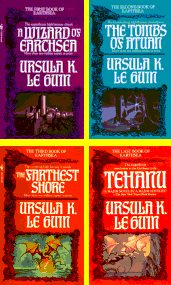|
Ursula K. Le Guin
Reviewed 11 November 1998; This is a bit different from the normal reviews on this site. Any serious reader of speculative fiction—and, for that matter, any serious fan of post-War fiction in English, or even most semiserious fans—should be familiar with Le Guin's work. Ursula Le Guin happens to write speculative fiction, most of the time. But she always writes excellent fiction. Her short fiction started appearing in "mainstream" Norton Anthologies, intended for teaching literature to undergraduates, back in the late 1970s, side-by-side with Laclos and Lagerqvist. Rather than review each title exhaustively, and individually, I've gathered the most essential of Le Guin's works that are currently in print in the table below. You can buy these books on-line through Powell's Books. | ||
| The Hainish Cycle
Much of Le Guin's more "science fictional" work has appeared as parts of her Hainish universe. Although there's no real sequence in which one must read the books—at least partly because they have such disparate timescales—I've tried to put them in a recommended order here. |
||
 |
The Left Hand of Darkness
Anyone interested in what it means to be human, gender issues, politics, character,
or fine storytelling should read this book. A watershed in speculative fiction, and one of the
top 25 or so novels published in English during the 20th century. |
|
 |
The Dispossessed: An Ambiguous Utopia
The most powerful utopian fiction written since Orwell. Unlike most utopian fiction, this book succeeds as pure fiction, too. |
|
 |
The Telling
Le Guin's most recent (summer 2000) Hainish novel. The title should be a giveaway: it is a story about the process and value of storytelling for itself. Another work in the Hainish cycle, the book also carries a strong message about fundamentalism—of all varieties, not just religious. Quite satisfying as literature and as a part of a universe. It is interesting to look at The Left Hand of Darkness through the lens provided by The Telling. |
|
 |
Four Ways to Forgiveness
Readable as a single book, these four novellas tell the story, through constantly changing perspectives, of several subcultures throwing off different kinds of slavery, and the implicit complicity of "neutral observers" in both the slavery and the revolts. |
|
| Earthsea
Originally marketed as a "children"'s series—the third volume won the National Book Award for Children's Literature—the Earthsea books are intense and a wide-ranging look at race, gender, and age roles. Anyone intending to write non-Western-European-analog fantasy simply must read these books, because there will be comparisons made. |
||

|
What a great set of children's themes—coming of age by facing the evil within, sex, and death! Tehanu is a bit of a departure from the 1960s sensibility of the first three books—it's much more gender-aware, and goes just a bit too far in attempting to redress the gender balance of power. |
|
| See the full review of Tales From Earthsea | ||
| Other Works
Le Guin has a broad range. Unlike many contemporary authors, she does not stick to just the familiar confines of one or two constructed worlds at a time. These are listed in no particular order. |
||
 |
The Lathe of Heaven
An interesting novel with a different approach than the two described above. Like much of Le Guin's "middle period" fiction, this novel concerns itself with how one constructs reality. Later became an eminently satisfactory PBS movie starring Bruce Davidson, which has recently been re-released for the first viewing since the original broadcast. |
|
 |
The Compass Rose
A startling range of stories, from the wry optimism of "The New Atlantis" to the biting, yet poignant, satire of "The Diary of the Rose" to the reality-twisting of "The Pathways of Desire." |
|
 |
The Wind's Twelve Quarters
This is almost an "Early Le Guin." It includes such notable pieces as the first Earthsea stories, the parable of scapegoats "The Ones Who Walk Away from Omelas," and the difficult to categorize "Vaster Than Empires and More Slow." |
|

|
||
|
Intellectual Property Rights: © 1998 John Savage. All rights reserved. You may contact me concerning permissions via email. This copyright notice overrides, negates, and renders void any alleged copyright or license claimed by any person or entity, specifically including but not limited to any claim of right or license by any web hosting service or software provider, except when I have transferred such rights with a signed writing that complies with the requirements for transferring the entire copyright as specified in Title 17 of the United States Code. This includes, but is not limited to, translation or other creation of derivative works, use in advertising or other publicity materials without prior authorization in writing, or any other non-private use that falls outside the fair use exception specified in Title 17 of the United States Code. If you have any question about whether commercial use, publicity or advertising use, or republication in any form satisfies this notice, it probably does not. Violations of intellectual property rights in these pages will be dealt with swiftly using appropriate process of law, probably including a note to your mother telling her that you're a thief. "The Savage Beast", "Savage Reviews", "Surreality Check", and the dragon-and-book banner are trade and service marks of the website owner. Other marks appearing on these pages belong to third parties, and appear either with permission or as exemplary references. |
||
